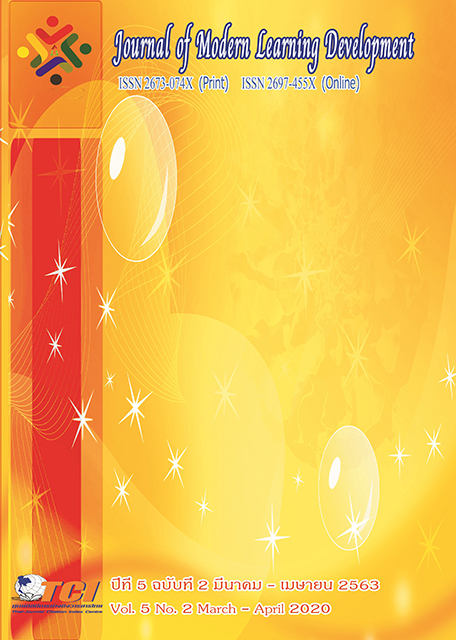Ariyā Vaddhi 5 as The Desirable Characteristics of Youth
Main Article Content
Abstract
Buddhist Principles of Youth have a Buddhism way in their life. They believe in Buddha Gem Acting in accordance with Buddhist principles and a good example to the public. By the way noble growth 5 in their life by following 1) confidence, means believing in the lesson and having confidence of real life. This is a thing to make life become more calmed down. By having wisdom, there is confidence that always stay by it. 2) Morality means not to make other bad, and not to disturb them. This stays with the calmed down feeling, and by controlling the heart. 3) Learning means gaining knowledge, and by getting a vision. It can make life become successful, and increase at a high level. Individuals will be happy, and be successful in life; as well as having peacefulness, and happiness. 4) liberality means share to people, and helping people. This prevents selfishness from occurring. 5) Wisdom, means understanding the lessons, real things to make everything clear, know both the bad and good things, know what things shouldn’t be done, and know about the real. This help to understand the lessons seen throughout life, at an early age. When a person is young, they will have noble growth 5. The young will make the religion, and be the nice example when young in the country in the future.
Article Details
References
กระทรวงศึกษาธิการ. (2540). วันสำคัญ โครงการปีรณรงค์วัฒนธรรมไทยและแนวทางในการจัดกิจกรรม. (พิมพ์ครั้งที่ 3). กรุงเทพมหานคร: โรงพิมพ์คุรุสภาลาดพร้าว.
พระธรรมกิตติวงศ์ (ทองดี สุรเตโช). (2548). พจนานุกรมเพื่อการศึกษาพุทธศาสน์ ชุด คำวัด. กรุงเทพมหานคร: วัดราชโอรสาราม.
พระพรหมคุณาภรณ์ (ป.อ. ปยุตฺโต). (2551). พจนานุกรมพุทธศาสตร์ ฉบับประมวลธรรม. (พิมพ์ครั้งที่ 16). กรุงเทพมหานคร: โรงพิมพ์บริษัท เอส.อาร์. พริ้นติ้ง แมส โปรดักส์ จำกัด.
พระพรหมคุณาภรณ์ (ป.อ. ปยุตฺโต). (2551). การสร้างเสริมคุณลักษณะเด็กไทย. กรุงเทพมหานคร: มูลนิธิการศึกษาเพื่อสันติภาพ พระธรรมปิฎก(ป.อ.ปยุตฺโต).
พระราชธรรมนิเทศ (ระแบบ ฐิตญาโณ). (2537). นิเทศธรรม. กรุงเทพมหานคร: ธีรพงษ์การพิมพ์.
พุทธทาสภิกขุ. (2533). โมขธรรมประยุกต์. กรุงเทพมหานคร: ธรรมทานมูลนิธิ.
พุทธทาสภิกขุ. (2537). เยาวชนกับศีลธรรม. (พิมพ์ครั้งที่ 2). อสุราษฎร์ธานี: มูลนิธิธรรมทาน.
พระไตรปิฎกภาษาไทย. (2539). พระไตรปิฎกภาษาไทย ฉบับมหาจุฬาลงกรณราชวิทยาลัย. กรุงเทพมหานคร: โรงพิมพ์มหาจุฬาลงกรณราชวิทยาลัย.
ไพโรจน์ อยู่มณเฑียร. (2549). วาทะธรรมว่าด้วยสันติภาพ. กรุงเทพมหานคร: บ้านลานธรรม.
เสกสันต์ ศิริวรรณ. (2553). ความศรัทธาในศีล 5 ที่มีต่อการปฏิบัตินของวัยรุ่น. วิทยานิพนธ์การศึกษามหาบัณฑิต. บัณฑิตวิทยาลัย: มหาวิทยาลัยศรีนครินทรวิโรฒ.


